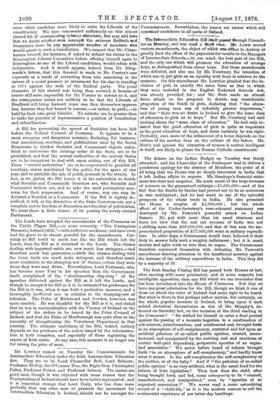The Lords have accepted the amendments of the Commons on
the Cattle Plague Bill,—or more correctly, "The Contagions Diseases (Animals)Bill,"—with sufficient meekness; and have even had the grace to be almost grateful for the amendments. Cer- tainly no Bill could be much less like the Bill which left the Lords, than the Bill as it returned to the Lords. The clauses dealing with imported cattle are now much less stringent,—and therefore much less protective,—while the clauses dealing with the home trade are much more stringent, and therefore much more conducive to the stamping-out of disease,---than they were when they were sent down. Nevertheless, Lord Fortescue, who has become more Tory in his speeches than the Government itself, complained of the "electioneering clap-trap" of the speeches delivered against the Bill as it left the Lords, and though he accepted the Bill as it is, he intimated his preference for the Bill as it was, when it was both a protective measure, and a thoroughly inefficient one in relation to the stamping-out of infection. The Duke of Richmond and Gordon, however, was more sensible. He was thankful for the Bill as it is, and stated that be was in communication with the Viceroy of Ireland on the subject of the orders to be issued by the Privy Council of Ireland, and that the Duke of Marlborough was quite alive to the necessity of strengthening the Veterinary Department in that country. The ultimate usefulness of the Bill, indeed, entirely depends on the prudence of the orders issued by the Administra- tion in both countries, and especially of those regulating the export of Irish cattle. At any rate, this measure is no longer one for raising the price of meat.






























 Previous page
Previous page